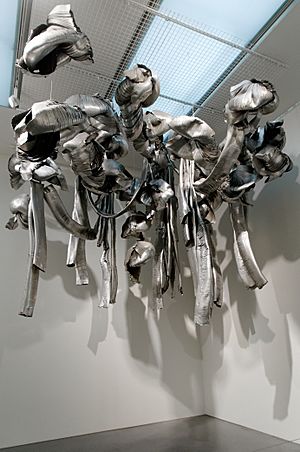Marisa Merz facts for kids
Quick facts for kids
Marisa Merz
|
|
|---|---|
| Born | 23 May 1926 Turin, Italy
|
| Died | 20 July 2019 (aged 93) Turin, Italy
|
| Known for | Sculpture |
| Movement | Arte Povera |
| Awards | Biennale di Venezia Award for Lifetime Achievement |
Marisa Merz (born May 23, 1926 – died July 20, 2019) was a famous Italian artist. She was known for her sculptures and unique art style. In the 1960s, she was the only woman artist linked to a special art group called Arte Povera. Marisa Merz won a big award, the Golden Lion, in 2013 for her amazing work. She lived and created art in Turin, Italy.
Contents
Early Life and Family
Marisa Merz was born in Turin, Italy, in 1926. Her father worked for Fiat Automobiles. As a young person, she studied classical ballet. She also worked as a model for the artist Felice Casorati.
In the 1950s, she met another artist named Mario Merz. They got married in 1960. They had a daughter named Beatrice, often called Bea. The family lived in the Alps for three years. Not much else is known about Marisa Merz's early life.
Discovering Arte Povera
In June 1967, Marisa Merz had her first art show. It was in Turin, Italy. For this show, she made an art piece from folded aluminum foil. Later that year, she had another show at a disco in Turin.
In 1968, she joined a special art event in Amalfi. This event was called Arte Povera + Azione Povera. It was organized by Germano Celant. Other artists like Michelangelo Pistoletto and her husband, Mario Merz, were also part of it.
Arte Povera means "poor art" in Italian. This art movement used everyday, simple materials. Artists wanted to show that art could be made from anything. They used things like dirt, rags, and common objects. Marisa Merz's art fit well with this idea. She used materials like copper, aluminum, and wax.
Marisa Merz's Unique Art Style
Marisa Merz's art often showed ideas about home and private spaces. She believed there was no difference between her life and her art. For example, her 1966 work Untitled (Living Sculpture) was made for her home. It was also shown in art galleries. This sculpture had thin strips of aluminum. They hung from the ceiling in coils and spirals. The Tate Modern museum bought this artwork in 2009.
She often used crafts and skills usually linked to women, like knitting. Her art was described as gentle, thoughtful, and personal. She did not usually give her artworks formal names or dates. She felt that art was "beyond time."
In 1975, Marisa Merz said that her life and work were connected. She spent a lot of time in her studio. There, she thought about life with her daughter, Bea. She felt her daughter taught her many things while she made her sculptures. After her husband Mario died in 2003, Marisa kept working into her 90s. In 2015, her daughter Bea opened an art center in Turin. It is called the Fondazione Merz.
Marisa Merz also showed her art in big international events. These included documenta 7 in 1982 and documenta 9 in 1992. She was also part of the Venice Biennale in 1988. Her first show in the United States was in 1994.
Awards and Recognition
Marisa Merz received important awards for her art. In 2001, she won the Special Jury Prize at the Venice Biennale. This is a very famous art exhibition.
In 2013, she won an even bigger award. She received the Golden Lion for Lifetime Achievement at the Venice Biennale. This award, also called the Leone d'Oro, celebrates an artist's entire career.
Recent Exhibitions
Marisa Merz's art has been shown in many places around the world. Here are a few examples:
- The Shape of Time at Walker Art Center, Minneapolis, USA (2005–2009)
- Marisa Merz at Gladstone Gallery, New York City, USA (May – July 2010)
- Marisa Merz at the Serpentine Gallery, London, UK (September – November 2013)
- Marisa Merz: The Sky Is a Great Space at Met Breuer, New York City, USA (2017)
Death
Marisa Merz passed away on July 19, 2019. She was 93 years old.
See also
 In Spanish: Marisa Merz para niños
In Spanish: Marisa Merz para niños


